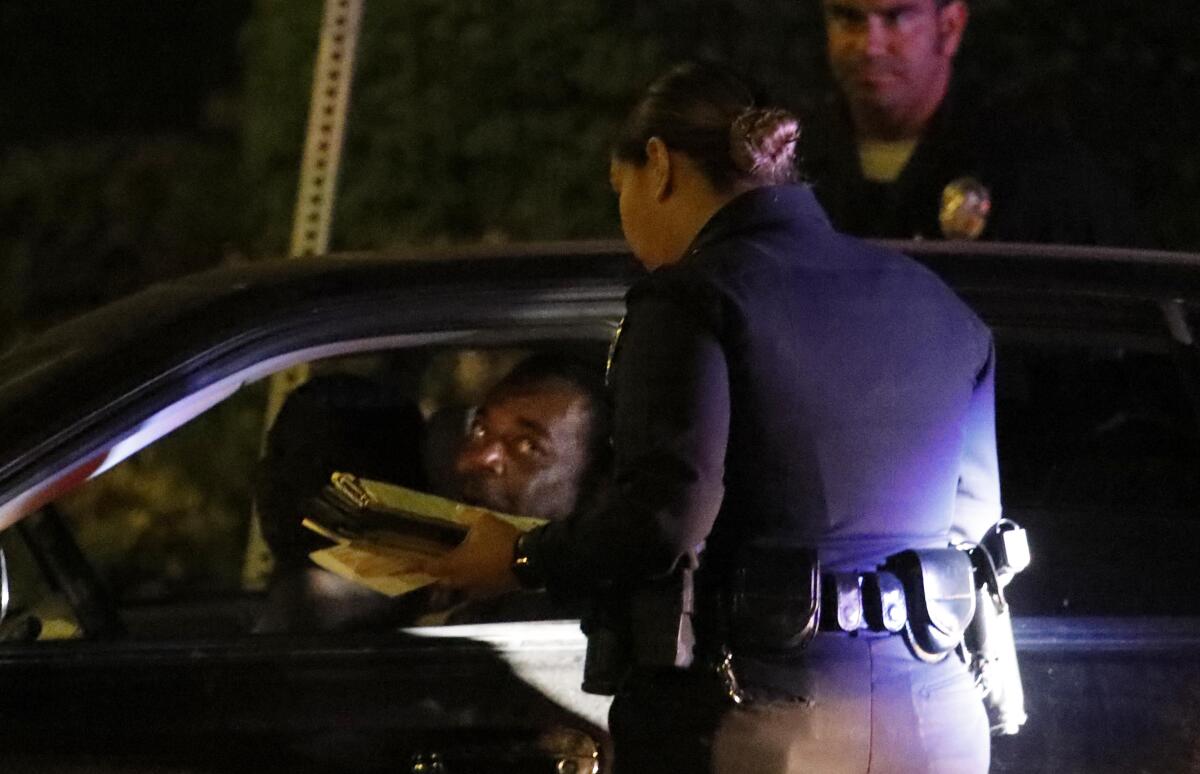Racial disparities in LAPD stops fueled by failed crime-fighting strategy, audit finds

An independent review of hundreds of thousands of stops conducted by Los Angeles police officers last year has found that racial disparities previously identified in a Times investigation were in part the result of failed strategies to use traffic and other minor violations “as a pretext to identify or suppress more serious crimes.”
Those strategies subjected Black and Latino drivers to far more stops than white drivers, even though Black and Latino people were less likely to be caught with contraband, and were “of limited effectiveness in identifying evidence of illegal firearms or other serious crimes,” the report by the LAPD Inspector General Mark Smith’s office found.
In addition, a review of video from nearly 200 stops found that LAPD officers had severely underreported the number of people they had stopped and searched, with officers failing to document searches for 23% of the people seen on video being searched.
That likely means the LAPD underreported the number of stops and searches by its officers to the state, the inspector general found.
The review also found that units specifically assigned to suppress crime made more stops in high-crime areas in communities of color, and were more likely to subject the people they stopped to extensive questioning — about their backgrounds, their parole or probation status and their criminal records — and to other tactics, such as handcuffing, forcing them to face a wall or checking tattoos.
The result was that Black and Latino men were subjected to such prolonged interrogations with far greater frequency, the review found. In some instances, officers admitted the stops were “a pretext” to investigate for more serious crime, the review found. Black and Latino drivers were more likely than white drivers to be stopped for equipment violations or expired registration rather than moving violations like speeding.
Only 2% of traffic stops resulted in an arrest, the report found.
After The Times reported on the racial disparities in 2019, the LAPD drastically cut back on vehicle stops, eventually admitting the strategy had been ineffective and reassigning elite Metropolitan Division crime suppression officers to other duties.
“Some of these actions appeared to be based on a person’s behavior or criminal background, including the fact that a person was on parole or probation for a serious crime or admitted to being a member of a criminal gang. In other instances, however, these actions were more discretionary and appeared to be part of a strategy to identify weapons, involvement in a violent crime, or gang-related intelligence,” the inspector general’s report said. “In some cases, the officers making the stop also acknowledged to the stopped person that the basis for the stop was a pretext, and the officers may not have even mentioned the initial violation at all during the stop.”
The report — which was requested by the Police Commission — was posted Friday as part of the agenda for the commission’s upcoming meeting Tuesday, where Smith and his staff will outline their findings.
Smith’s office declined to comment prior to Tuesday. Josh Rubenstein, an LAPD spokesman, said LAPD Chief Michel Moore would address the findings during the Tuesday meeting as well.
The inspector general’s findings confirm and expand on those of The Times in an investigation published in January 2019 that showed that the LAPD’s Metropolitan Division — tasked with suppressing violent crime — stopped Black drivers at a rate more than five times their share of the city’s population.
In response, Mayor Eric Garcetti ordered the department to scale back on vehicle stops.
Later that year, The Times published a second investigation showing that Black and Latino people were searched far more often than white people during vehicle stops, even though white people were more likely to be found with illegal items.
Compared to white people, Black and Latino people were much more likely to be removed from the vehicle, handcuffed or detained at the curb. Black and Latino drivers also were more likely than white drivers to be stopped for an equipment violation, such as a broken taillight or tinted windows, the Times investigation found.
Days after the second Times investigation was published, Moore said the Metro Division would drastically cut back on pulling over random vehicles, which had been a cornerstone of the city’s crime-fighting strategy.
Moore acknowledged the vehicle stops had not proven effective while coming at a tremendous cost to innocent drivers who felt they were being racially profiled.
Metro crime suppression officers, who had spent much of their time stopping motorists and pedestrians in an effort to combat violent crime, were assigned to other tasks such as tracking down specific suspects — a role that has continued this year, as homicides and shootings have surged.
Based on its latest findings, the inspector general’s office made several recommendations.
It recommended the LAPD work to eliminate or reduce racial disparities in stops, including by continuing to “refocus its crime fighting strategies away from the use of pretextual stops — particularly those pretextual stops based on minor equipment or regulatory violations, which more heavily impact low-income communities.”
It recommended that the LAPD “develop a policy that consolidates and sets forth clear guidelines and parameters about post-stop activities such as removing a person from their vehicle, conducting pat-downs and other searches, completing [field interview] cards, and handcuffing individuals, including consideration of any officer safety issues that must be taken into account.”
The LAPD should continually evaluate the “effectiveness of its crime-fighting strategies, including their impact on community members as well as community trust and legitimacy,” the inspector general recommended, and balance the benefits of any strategy “against the cost to the individuals impacted as well as to community trust.”
The LAPD also should improve its collection of data around stops, and ensure that officers “fully document and justify all pat-downs and other searches, as well as other post-stop activities,” the inspector general recommended.
More to Read
Sign up for Essential California
The most important California stories and recommendations in your inbox every morning.
You may occasionally receive promotional content from the Los Angeles Times.












